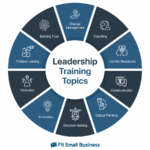You know that feeling, right? That little knot in your stomach when you know you should speak up, should ask for more, or should stand your ground, but the words just… don’t come out right? Or worse, they come out all wrong, leaving you feeling defeated and wishing you could rewind time? Yeah, that used to be me. For years, I let opportunities slip through my fingers – a better salary, a fairer price, even just getting my friends to agree on a movie night without feeling like I was steamrolled. My heart would pound, my palms would sweat, and I’d usually end up accepting whatever was put in front of me, only to stew in regret later.
Then, one day, scrolling through endless articles about self-improvement (because, let’s be honest, that’s where most of us start), I stumbled upon an advertisement for a negotiation course. My first thought? "Me? Negotiate? I can barely negotiate with my cat to get off the counter!" But a tiny spark of curiosity, fueled by years of silent frustration, flickered to life. What if this was the answer? What if I could actually learn the skills to speak up, advocate for myself, and achieve better outcomes without becoming some aggressive, pushy person?
So, I took the plunge. And let me tell you, it was one of the best decisions I’ve ever made. This isn’t just about getting a discount on a car; it’s about finding your voice and building stronger relationships.
Why I Decided to Take the Plunge: Beyond Just Money
Before diving into what I learned, let me paint a clearer picture of my "before." I was the person who:
- Would accept the first salary offer, even if it felt low, because asking for more felt greedy or confrontational.
- Hated buying anything big (cars, appliances) because I felt outsmarted by salespeople.
- Struggled to set boundaries with friends or family, often saying "yes" to things I didn’t want to do, leading to resentment.
- Felt unheard in team meetings, watching my ideas get overlooked while others confidently presented theirs.
I realized that negotiation skills weren’t just for business bigwigs or high-stakes deals. They were life skills. They impact how you manage your career, your finances, your relationships, and even your peace of mind. I wanted to feel more confident, more in control, and less like a passenger in my own life. That’s why I started looking for the best negotiation course I could find – one that focused on practical, real-world application, not just dry theory.
What Exactly Is Negotiation (Beyond the Boardroom)?
When I first thought of "negotiation," images of tense boardrooms and cutthroat business deals came to mind. My course quickly shattered that narrow view. Our instructor, a warm and incredibly insightful person named Sarah, explained it beautifully:
"Negotiation isn’t about winning at someone else’s expense," she said. "It’s about having a conversation to reach an agreement where everyone involved feels heard and, ideally, gets most of what they want. It’s about finding common ground, even when your starting points are different."
She showed us that we negotiate all the time:
- Deciding where to go for dinner with your partner.
- Asking for an extension on a project deadline.
- Discussing chores with housemates.
- Haggling over a price at a flea market.
- Talking to your kids about bedtime.
This broader understanding instantly made the whole concept less intimidating. It wasn’t about being aggressive; it was about effective communication and problem-solving. It was about learning how to negotiate in everyday life.
The Core Pillars: What I Learned in My Negotiation Course
The course was a revelation. It wasn’t just lectures; it was interactive, full of role-playing, group discussions, and exercises that pushed me out of my comfort zone in the best possible way. Here are some of the most impactful lessons that transformed my approach:
1. The Power of Preparation: Knowing Your BATNA
This was probably the biggest "aha!" moment for me. Sarah introduced us to the concept of BATNA (Best Alternative to a Negotiated Agreement). Sounds fancy, right? It’s actually incredibly simple and powerful.
Your BATNA is your backup plan. It’s what you will do if you don’t reach an agreement. If you’re negotiating a salary, your BATNA might be your current job, or another job offer you’ve received. If you’re buying a car, it’s the other car you’re considering.
Why is this so crucial? Because knowing your BATNA gives you power. If you have a strong backup plan, you’re not desperate. You can walk away if the deal isn’t good enough. It shifts your mindset from "I need this" to "I want this, but I have options." This simple idea completely changed how I approached every potential deal. I learned to research, to think through my alternatives, and to enter conversations feeling much more grounded.
We also touched on WATNA (Worst Alternative) and ZOPA (Zone of Possible Agreement), which helped me understand the full spectrum of outcomes. Knowing these terms and how to apply them immediately made me feel more equipped to improve negotiation outcomes.
2. Listening More, Talking Less: The Art of Empathy
My old approach to negotiation (if you could even call it that) was to blurt out my demands and hope for the best. The course taught me that true negotiation starts with listening. Deep, active listening.
Sarah taught us to ask open-ended questions: "Can you tell me more about that?" "What’s most important to you in this situation?" "What are your concerns?" The goal wasn’t just to wait for my turn to speak, but to truly understand the other person’s perspective, their needs, their fears, and their motivations.
When you understand what the other side genuinely wants, you can often find creative solutions that benefit both parties. It stops being a battle and starts being a collaborative problem-solving session. This shift from "me vs. them" to "us vs. the problem" was incredibly freeing. It also made me realize that empathy isn’t a weakness; it’s a powerful tool in negotiation training.
3. Mastering Your Message: Framing and Body Language
It’s not just what you say, but how you say it. We spent a lot of time on framing – presenting your requests in a way that resonates positively with the other person. Instead of saying, "I need a raise because I’m underpaid," we learned to say, "I’m looking to align my compensation with the value I bring and my contributions to [specific achievements]." See the difference? One sounds like a complaint, the other sounds like a professional discussion about value.
We also delved into non-verbal communication. Our body language, tone of voice, and even eye contact send powerful messages. I learned to maintain open posture, make appropriate eye contact, and modulate my voice to convey confidence and calm, even when I felt nervous inside. This aspect of the negotiation course was a real eye-opener, as I realized how much I’d been undermining myself with fidgeting or avoiding eye contact.
4. Handling the Curveballs: Dealing with Difficult Tactics
Not every negotiation is sunshine and rainbows. Sometimes you encounter people who are aggressive, dismissive, or try to use manipulative tactics. The course equipped me with strategies to handle these situations without losing my cool or giving in.
We practiced saying "no" gracefully but firmly, without feeling guilty. We learned techniques like "re-framing" their aggressive statements into neutral questions, or simply taking a pause before responding to avoid knee-jerk reactions. It was about standing your ground respectfully, rather than retreating or escalating. This section was particularly empowering, as it gave me the tools to protect my boundaries.
Real-World Impact: Applying My New Skills
Leaving that course, I felt like I had a superpower. It wasn’t magic, but it felt pretty close. The change wasn’t instant, of course. It took practice, and I definitely fumbled a few times. But slowly, steadily, I started to see the results.
- The Salary Talk: The first big test came when my annual review rolled around. Instead of meekly accepting, I came prepared. I had my BATNA (what I’d do if the offer wasn’t right), I had a clear understanding of my value, and I had practiced my framing. I asked for a significant raise, backed by data and specific achievements. Guess what? I got it. Not the full amount, but substantially more than I would have settled for before.
- The Car Purchase: Remember my dread of car salespeople? My next car purchase was a completely different experience. I researched, knew my budget, had a clear BATNA (other cars and dealers), and approached the conversation with confidence. I asked questions, listened intently to their needs, and walked away feeling like I got a fair deal, not like I’d been fleeced.
- Everyday Wins: From getting a refund for a faulty product without a fuss, to delegating tasks more effectively at work, to simply feeling more confident in expressing my opinions in social settings – the ripple effects were everywhere. Even convincing my family to try a new restaurant became a fun, collaborative negotiation rather than a tense debate.
Is a Negotiation Course Right for You?
If any of my "before" story resonated with you, then yes, absolutely. A negotiation course is an investment in yourself that pays dividends across every aspect of your life. It’s not about becoming a shark; it’s about becoming more articulate, more confident, and more effective in getting what you need and want, while also building better relationships.
Whether you’re looking for an online negotiation course that fits your schedule, or an in-person workshop that offers hands-on practice, there are options out there. Look for programs that emphasize practical application, role-playing, and a balanced approach to negotiation – one that values collaboration over confrontation.
Final Thoughts: Unlock Your Potential
Before this course, I truly believed that some people were just "good at negotiating" and others weren’t. I thought it was an innate talent. What I learned is that negotiation skills are learned skills. They can be taught, practiced, and mastered by anyone.
Taking that leap of faith to enroll in a negotiation course didn’t just teach me how to haggle; it taught me how to value myself, how to communicate effectively, and how to navigate the world with greater confidence and less fear. If you’re tired of feeling unheard or undersold, I can’t recommend it enough. It’s time to stop fumbling for words and start negotiating your way to a more empowered life.



